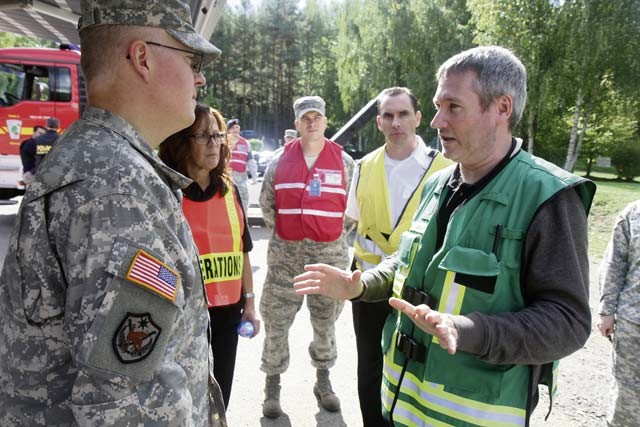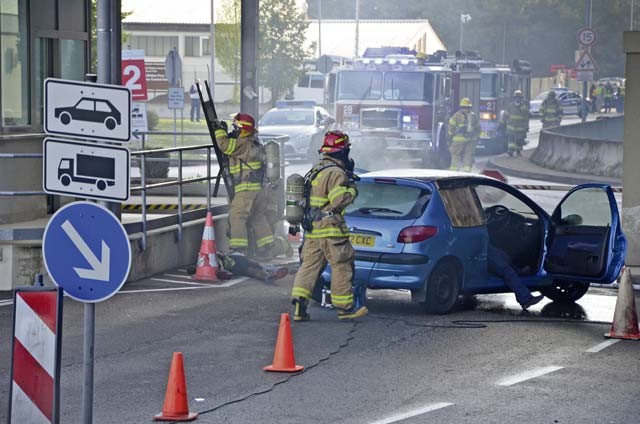
Oliver Vollmer, a German police liaison, discusses with Col. G. Shawn Wells Jr., U.S. Army Garrison Rheinland-Pfalz commander, how German police commandos respond to a hostage incident during Warrior Response 15 in Kaiserslautern.
Simulated chaos at U.S. Army Garrison Rheinland-Pfalz forced U.S. Army, U.S. Air Force and German first responders to react to scenarios of car bombs, hostage-taking gunmen and a suspected chemical attack.
Dubbed “Warrior Response 15,” the daylong training event took place Sept. 24 on Pulaski, Ramstein and Smith. Extra security measures were put into place at all Army and Air Force installations in the area, as responders set to work.
The exercise tested U.S. Army Garrison Rheinland-Pfalz’s command and control capabilities during simulated terrorist attacks. The response included German Polizei and U.S. Air Force security forces as well as the U.S. Army Reserve’s 773rd Civil Support Team, a unique 7th Civil Support Command unit that responds to chemical, biological, radiological and nuclear events.
“Protecting military members and their families is our top priority,” said Col. G. Shawn Wells Jr., the garrison commander. “Training together with the Air Force, our German neighbors and the local Army Reserve unit is essential because this is how we would respond to an actual emergency.”
During the scenario, a simulated explosion occurred at Pulaski’s entrance. As first responders from the U.S. Air Force 86th Airlift Wing and local German authorities joined garrison security and emergency personnel at the scene, the situation developed as a shooter nearby took hostages.
Meanwhile, in Baumholder a simulated contaminant was found at the post office.
“A key element of this training is building the alliance in partnership with our German emergency response professionals,” Wells said. “This exercise was also a great leadership development opportunity.”
U.S. and German forces established security as emergency service workers responded. Then, word of a hostage scenario nearby forced leaders to broaden their focus toward a second hostile threat. In Baumholder, the 773rd survey team set up their gear in the post exchange parking lot while awaiting word from garrison firefighters to move forward.
Covered in protective gear, the 773rd survey team determined what the hazard was and collected a sample for further analysis, said Capt. Jon Underberg who led the survey team. As part of a premiere 7th Civil Support Command unit, the 773rd Soldiers are also key players in U.S. Army Europe’s outreach to partner nations. The team is committed to supporting U.S. Garrisons overseas, Underberg said.
“The garrison is our primary focus. We have to be able to, at any moment, load out and respond,” Underberg said.
While the Reserve Soldiers often work with local garrison staff, there are always new people to meet as Soldiers and civilians rotate into local units. Training strengthens the bonds that would be needed in a real emergency.
“This training helps us build those connections and maintain the relationships that we already have,” Underberg said.
Training in Germany is sort of a homecoming for Staff Sgt. Adrian Sherfield, a full-time Army Reserve Soldier assigned to the 773rd. Born in Germany, Sherfield returned this summer.
At his last unit Sherfield did mostly administrative tasks. By taking part in Warrior Response 15, Sherfield was exposed to greater responsibilities, empowering a junior leader as suggested in U.S. Army Europe’s five pillars of Strong Europe.
“For me it’s good experience,” Sherfield said. “I’m glad to have this exercise under my belt.”



